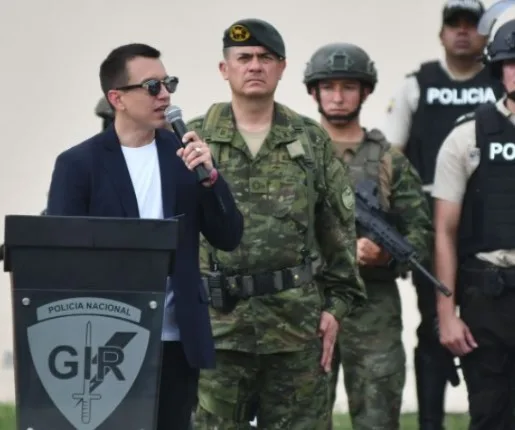Noboa blasts past presidents for crime surge; Poll shows support for referendum; Groups sue to stop VAT hike; Power blackouts could return
Blaming previous governments for allowing criminal organizations to grow to “uncontrollable levels,”  President Daniel Noboa said Tuesday he would continue a “vigorous crime fight” after the current state of emergency ends next week. “I will not play the fool like other presidents have and look the other way,” he said at a police facility in Manta. “We are going to confront the criminals and use all our resources to do it.”
President Daniel Noboa said Tuesday he would continue a “vigorous crime fight” after the current state of emergency ends next week. “I will not play the fool like other presidents have and look the other way,” he said at a police facility in Manta. “We are going to confront the criminals and use all our resources to do it.”

President Daniel Noboa at National Police headquarters in Manta on Tuesday.
In his comments, Noboa also pushed a “yes” vote on the questions of the April 21 referendum, saying the assistance of the armed forces and the option to extradite drug gang leaders is essential to restoring order in the country. “We have made progress in the fight against terrorism and regaining control of our prisons, but I ask the people for their support to continue this work.”
The president said the security council he established last week will be headquartered in Manta “because this is where the worst crime is.” He added that weekend murders in Manta, Puerto Lopez and Guayaquil show that law enforcement must concentrate its work where organized crime is based. “The coastal communities and provinces need our support and they will receive it.”
Groups sue to stop VAT hike
The Guayaquil Chamber of Commerce and the Association of Private Banks have filed suits to reverse the 15% value added tax hike that went into effect on Monday.
In addition to opposition from business interests, the tax is also being challenged by the Citizens Revolution and National Unity political parties.
Although their priorities differ, all opponents of the tax claim its enforcement is unconstitutional and that President Daniel Noboa overstepped his authority by overriding the objections of the National Assembly. Although temporary tax increases on profits of large companies, banks and financial cooperatives, as well as an increase in the Foreign Exchange Exit Tax were approved by the Assembly, it objected to the VAT hike.
The banking association is objecting to all tax increases, especially the ones on bank profits, saying it will negatively impact economic recovery.
Citizens Revolution, on the other hand, proposes alternatives, including higher taxes on high-income individuals.
Poll shows low trust in institutions, support for referendum
In a new poll, Ecuadorians showed little trust in the country’s judicial system, political parties, the electoral council and the National Assembly. Only 11.46% of respondents rated judges and the judicial council reliable, the lowest rating for seven public institutions.
Conducted last week by the Click Report public opinion group, only 16.68% of Ecuadorians said they trusted the political parties while the National Electoral Council and the National Assembly received 18% and 25.2% positive ratings.
As it has in the past, the armed forces received the highest support of all public institutions at 77.28% followed by the presidency at 61.42%, the Attorney General’s office at 60.83% and the National Police at 60.5%.
On a question about the April 21 referendum, 66% said they would vote “yes” but 80% said they had not yet read all 11 questions. More than 72% of respondents rated crime and security as their top concern.
Power blackouts could return
Roberto Aspiazu, President of the Ecuador Chamber of Energy said Tuesday that scheduled power outages could return unless recent rains continue. “The unscheduled electric outages of the last two weeks show the vulnerability of the country’s power generation to weather conditions,” he said Tuesday. “The rainfall of the last two days is very welcome but the deficit remains extreme and we need much more to restore reservoir levels.”
Aspiazu said the announcement Tuesday by the Colombian government that it will reduce energy transfers to Ecuador is particularly worrisome. “They are experiencing the same drought we are, which means the reservoirs at their generation facilities are low, just as ours are,” he said.
Reservoir levels at power generation plants on the Paute River are Aspiazu’s biggest concern. “The watershed in the southern region of the country has not been fully replenished since last year’s power crisis, and this continues to be a problem,” he said. “Heavier seasonal rains usually arrive in March but did not this year. Now that El Niño conditions are diminishing, our hope is that normal rainfall patterns will return.”





















